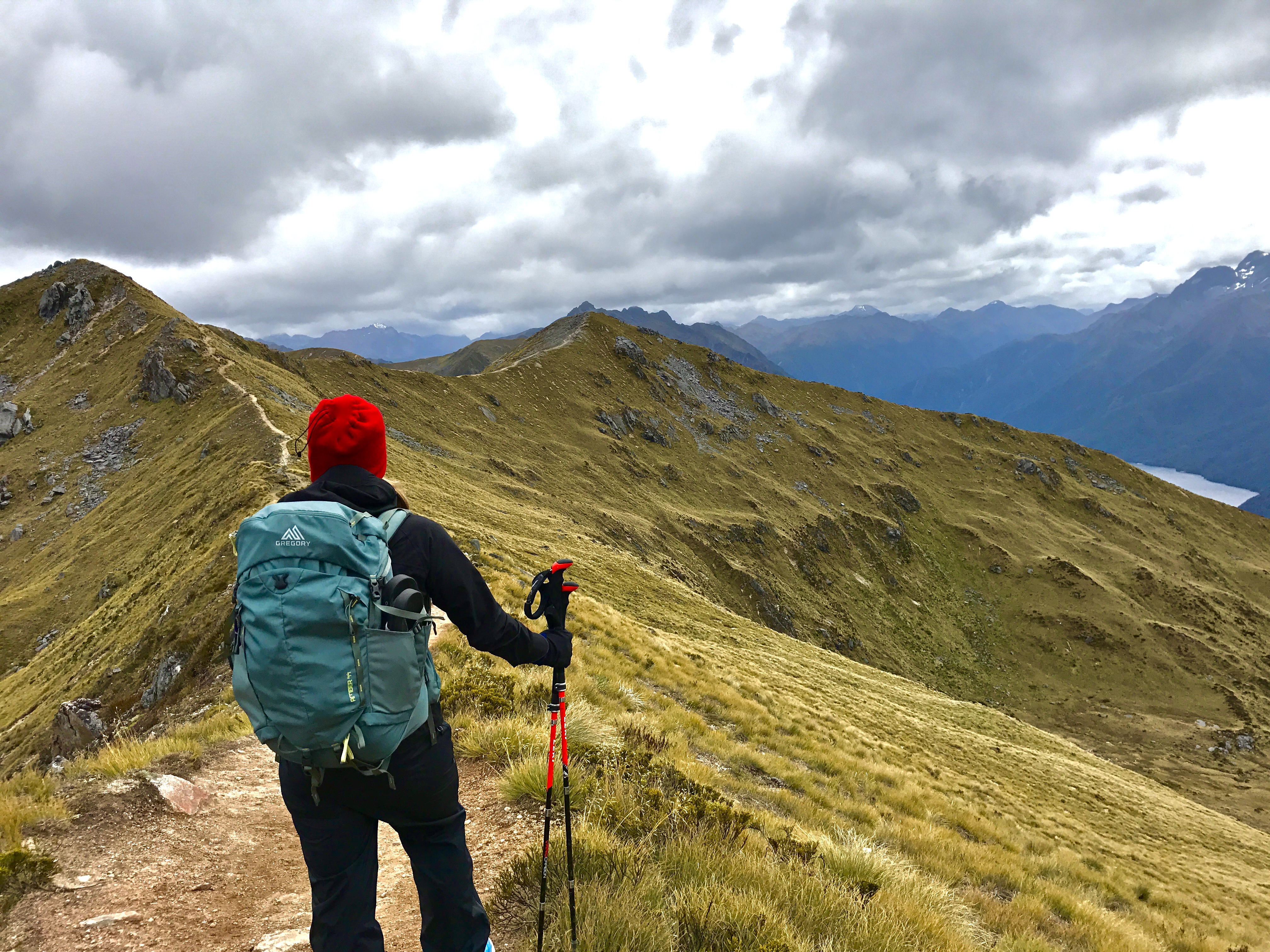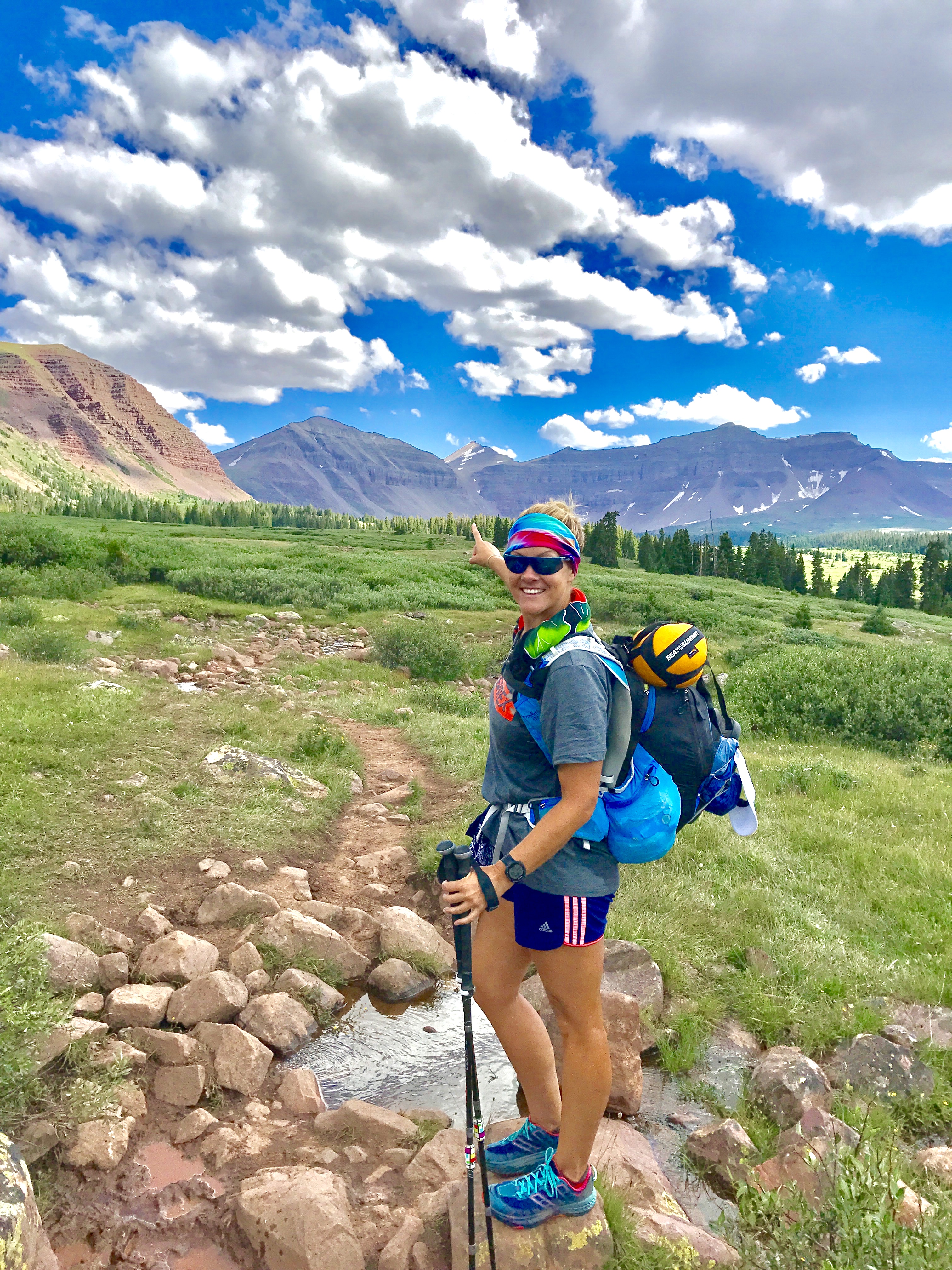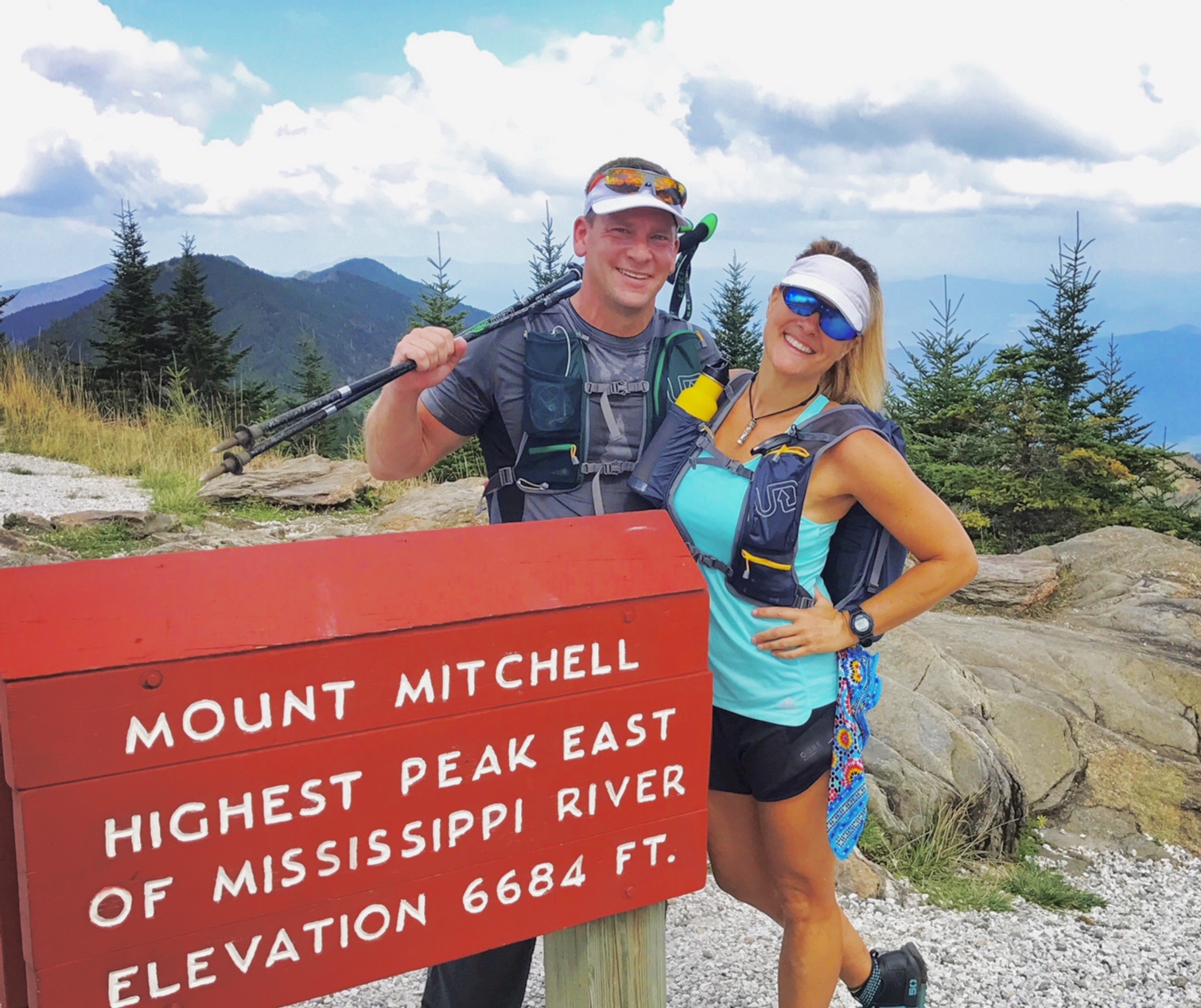TOP 10 TRIP PLANNING TIPS
You will get the most out of any experience when you take the time to prepare. Include a budget, guidebooks, tourist information websites and travelers reviews into your decision making process.
1 | Geography: Study maps, orienteering, distance, altitude, obstacles & pacing
2 | History: Major Events & Places to See, Religion, Politics
3 | Culture: Customs: social, business & tipping etiquette, Current vents, Music
4 | Language:
Learn the basics:
-
-
- Greetings – hello, good bye,
- Pleasantries – thank you, your welcome,
- Numbers – counting to 10
-
5 | Food:
Local delicacies
- Allergies
- Availability
6 | Money:
Local Currency & Exchange Rate
- Accessibility
- Notify your bank & credit card companies to make sure your cards will work outside the country
- Availability of local banks &
- ATMs
- Payment Options – some hotels, restaurants and stores in 3rd world countries can not process credit cards for payment,
- Budget
- Cash – Bring lots of $1 & $5 for tipping
7 | Transport:
Getting Around
- Public transportation (ferries, boats, planes, trains, subways, buses, cars, rickshaws, bikes etc.)
- Airline baggage policies – fees, carry-on, checked luggage, weight restrictions.
- Guide Services
- Road & Trail Conditions
8 | Advisories:
US Department of State International Travel Advisories
- Political
- Environmental (i.e. volcanos, weather)
- Outbreaks – Diseases
9 | Medical: Travel Vaccinations: Some diseases require a series of shots over 6 months. Make sure you give yourself enough time.
Centers for Disease Control & Prevention
- Tetanus – 1 Shot = 10 Years
- Yellow Fever – 1 Shot = 10 Years
- Polio Booster – 1 Shot = 10 Years
- Typhoid – 1 Shot – 2 Years
- Hepatitis A – 2 Shots over 6 months = Lifetime
- Hepatitis B – 3 Shots over 6 months = Lifetime
- * Malaria – Pills to be taken over a certain length of time
(I do not take these. Flu like symptoms are common side effects)
Prescriptions: bring enough & keep copies of prescriptions
Vitamins
- First Aid Kit:
- band-aids
- small sewing kit
- alcohol swabs
- super glue,
- ace bandage
- electrolytes powder packets
- water purification pills
- emergency space blanket
Medicine:
- Ibuprofen – anti-inflammatory
- Imodium & Maalox – stomach
- Benadryl – antihistamine
- Neosporin – antibiotic ointment
- Cipro – antibiotic
- Diamox – anti-altitude
- Melatonin – natural sleep aid
- Probiotics – digestive aid
10 | Paperwork:
Communication
Entrust a contact at home with your detailed travel itinerary, accounts and emergency information, including medical history, living will and last will & testament.
Keep a copy of your passport, itinerary, allergies & emergency contact information with you.
Passport
Make sure it is up-to-date
Keep a copy with you (not with original) & leave one at home
Driver’s License
Even if you are not planning on driving internationally, it is always good to have another form of ID.
Visas
Country requirements; time limits, dates, multi-entry etc. Give yourself enough time to obtain documents.
Embassy Notification: https://travelregistration.state.gov/ibrs/ui/
Permits
Give yourself enough time to obtain documents
International Travel Insurance
It is advised to obtain travel insurance for belongings and health. Your at-home medical plans will not cover anything out of the country.
Itinerary
dates, lodging, guide service & flights
Emergency Contact Information
Will, Living Will & Temporary Power of Attorney
Master Accounts Document
Update a master document that lists your credit cards, bank accounts, investments etc. Don’t keep this document directly on you, but save it somewhere virtually so you can access it if you needed.
Money
Include small denominations as most guides and people requiring tips will accept American currency.
Medical
Copy of prescriptions
TOP 10 Multi-Purpose Items
| MULTI-PURPOSE ITEMS | USES | RECOMMENDATIONS |
| Sarong, Wrap or Large Bandana | Blanket, Dress, Skirt, Scarf, Towel, Head Covering, Sling, Bandage, Tarp, Tablecloth, Bag, Trail Marker, Water Filtration, Curtain | |
| Garbage Bag | Trash, Impromptu poncho, Dry-bag, Water Transpiration, Water Collection, Storage | |
| Biodegradable Soap | Body wash, Shampoo, Dish Soap | Dr. Bronner’s All-One Soap |
| Poncho | Tarp, Floor Mat, Impromptu Tent, Rain Protector Covering Self & Pack | Ultra-Sil® Nano Tarp Poncho |
| Duct Tape | Tent, Pack, Shoe or Clothing repair, Band-Aid, Sling, Rope*Wrap it around trekking poles | |
| Super Glue | First-Aid (sealing a wound), Repairing Water Bottle, Shoe | |
| Lip Balm/Chapstick | Fire Accelerant, Moisturizer, Lubrication for Hinges, Stuck Ring, Eye-makeup Remover, Shoe Shine | |
| Hammock | Sleeping, Tarp, Blanket, Bag, Water Filtratio | Grand Trunk Hammocks |
| Para-Cord Bracelet or Belt | Emergency Cordage – Shoe Laces, Clothes Line, Stringing, Tying Things Up, Floss, Thread, Fishing Lure & Line. | Para-Cord Guy |
| Smart Phone | Camera for photos and making copies of maps, passport, itinerary, Internet, GPS, Calendar, Calculator, Contacts, Music/ Audiobooks and helpful travel applications for transportation, maps, accommodations, translation and learning another language. | Applications: Rosetta Stone, Fabulo |
BACKPACKING
Ounces equal pounds = Keep in mind the above Multi-Purpose Items and Packing Tips.
Calories per Ounce = FOOD becomes a major contributing factor to pack weight, especially in self-supported adventures. Optimize caloric intake per pound.
Rule of Thumb: No more then 2 lb. of food per person, per day. Each person should have about 2,000 calories of food per day.
Itemize everything you want to pack in a spreadsheet. List each item by category (Food, Clothes, Gear & Toiletries), weight and amount.
| What you do NOT need Backpacking! |
| 1. Make-Up 2. Blow Dryer, Curling Iron or Flat Iron 3. Hair Spray 4. Jeans 5. Perfume or Cologne |
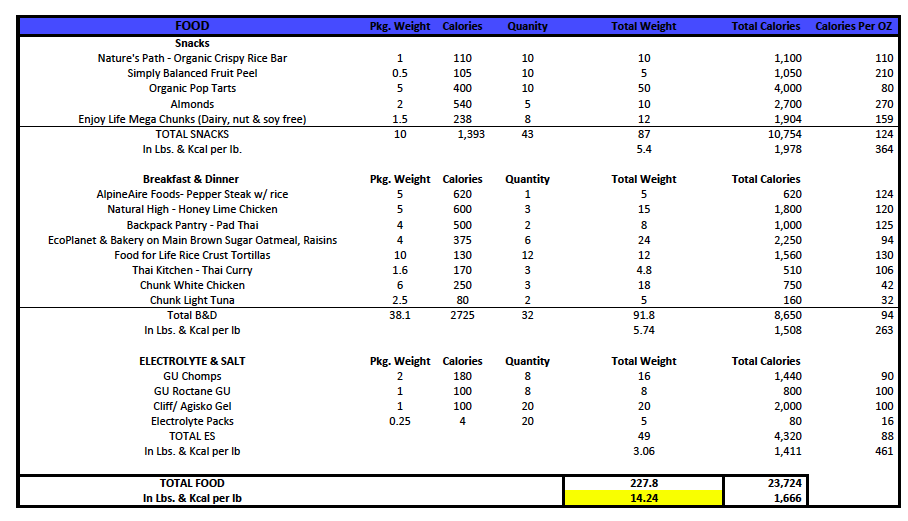
Food 
Clothes 
Toiletries 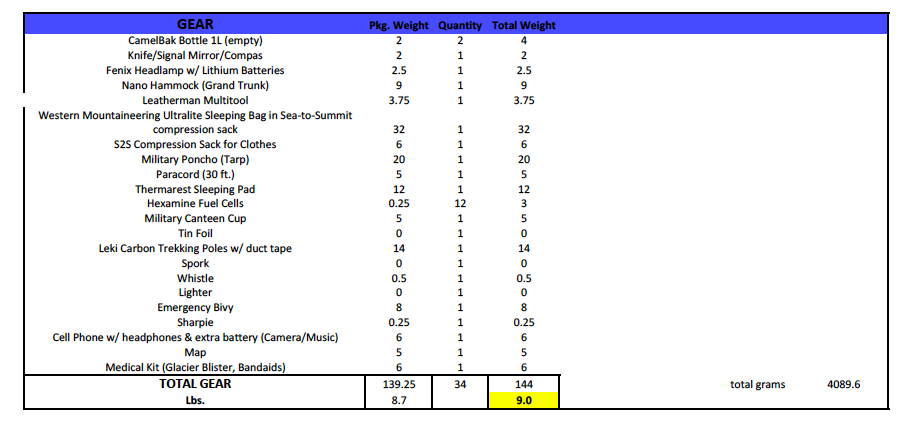
Gear

PACKING TIPS
Customize your packing for the specific adventure, , length of time, mode of transportation and find multi-purposes for items so you can pack less! Embrace washing clothes in a sink, bathtub, shower or river.
Customize your packing for the specific adventure, weather conditions, length of time, mode of transportation and always find multi-purposes for items so you can pack less! Embrace washing clothes in a sink, bathtub, shower or river.
Adventure – What kind of gear and apparel is needed? Are you bringing gear or can you rent it when you get there?
Weather – Know the seasons and what to expect, not just if it will be hot, cold, humid, arid, rainy, windy etc. In certain areas, seasonal conditions can result in an abundance of mosquitos, flies and other peculiarities that many travelers overlook.
Length of Time – For leisure adventures, mix and match clothes to create different outfits. What you pack for a 3 day trip is the same amount needed for a 2 week trip. No more.For rugged adventures, functionality of what you wear is more important, pack weight and the ability to layer up for colder weather.
Transportation – Never check a bag if you can help it. This eliminates the airlines opportunity to lose it. Know the airlines baggage policy when it comes to fees and weight restrictions.
Don’t underestimate the challenges of negotiating trains, subways and stairs with a lot of luggage. Sometimes a backpack is easier to strap-on versus dragging wheeled luggage on and off trains/subways and up and down stairs.
Multi-Purpose – Whether its a leisure adventure or rugged, find multi-purposes for items you pack. For ladies, if you need to dress it up, bring a sarong or maxi-skirt. Both can be worn as a skirt or as a dress. Shorts for men can be swim trunks. Below are examples of other multi-purpose items.


